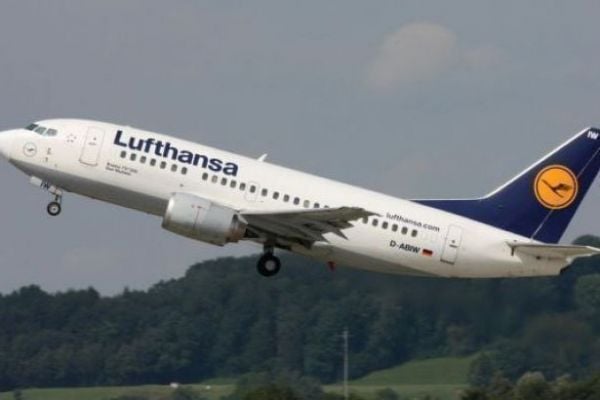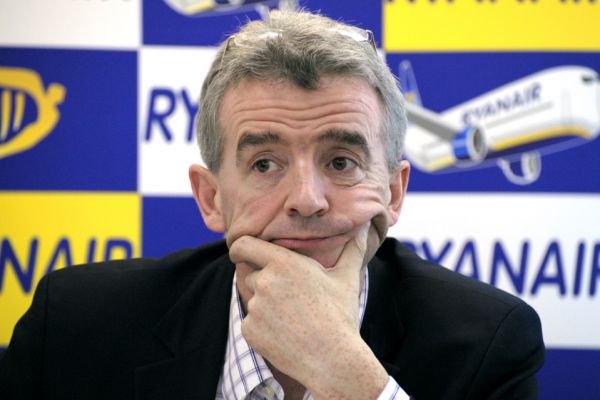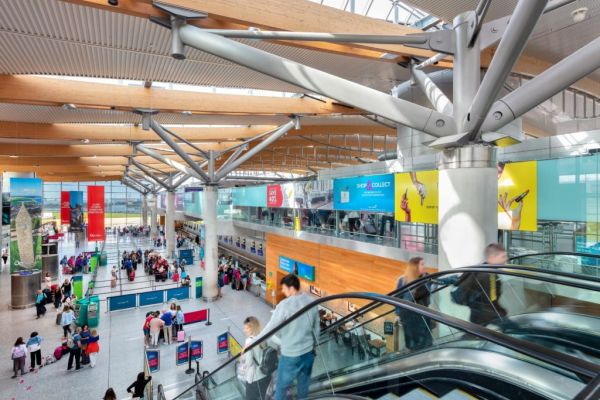The Italian government has launched the process to find a partner for ITA Airways and in a first stage will retain a minority stake in the successor company to Alitalia, Economy Minister Daniele Franco has said.
Rome has drafted a decree which lists ways it can offload its holding in the airline, including a direct sale or a public offer, without setting a deadline for a deal.
"There are subjects interested in the operation but we do not have a plan under which we can predetermine the timing," Franco said during a news conference after a cabinet meeting.
State-owned ITA started flying on 15 October and has been looking for equity partners.
Shipping company MSC and Germany's Lufthansa have expressed an interest in buying a majority stake in ITA, and asked for an exclusivity period of 90 days to iron out details.
Other suitors may emerge in the coming weeks if ITA opens its books to prospective buyers.
Delta Air Lines Inc said last month that it had no plans to invest in ITA.
In past decades, Alitalia tried and failed to clinch alliances with Air France and, more recently, Gulf airline Etihad.
The Italian government has spent an estimated 10 billion euros of taxpayers' money on Alitalia over the years.
FACTBOX-The Assets ITA Airways Can Offer Suitors
Shipping group MSC and airline Lufthansa are interested in buying a majority stake in Alitalia's successor, ITA Airways, despite the airline's history of failed privatisations and €170 million operating loss in 2021.
The Italian government has spent an estimated €10 billion of taxpayers' money on Alitalia over the years. Here is what may be attractive to ITA's suitors:
Streamlined Organisation, Reduced Costs
ITA has a fleet of 52 aircraft, less than half that of Alitalia, and employs around 2,300 people compared with nearly 11,000 at Alitalia in 2019. Some 7,000 former Alitalia employees have been put on a layoff scheme funded by the government.
ITA has signed a labour contract that is less generous than that of Alitalia. The new carrier only owns an aviation business, without handling and maintenance operations.
ITA operates fewer routes than Alitalia did after cancelling several domestic point-to-point flights and reducing long-haul routes to just Rome-New York. It plans to expand its long-haul operations, starting from the summer.
Milan City Airport
ITA owns the majority of take-off and landing rights at Milan's Linate airport, which is considered a key base for routes to European destinations. Linate traditionally attracts an important share of business passengers as Milan is Italy's financial capital and the airport is only 6.5km from the city centre.
Rome Fiumicino Airport
ITA's hub is an important entry point for both Italian domestic routes and international destinations. Rome is at the centre of the Mediterranean, making Fiumicino attractive for developing routes towards Africa. Rome is also a key tourist destination in Italy, with high-speed train connections with several Italian cities.
Alitalia Brand
ITA bought the old Alitalia brand for €90 million last year to avoid it being acquired by one of Alitalia's competitors. The brand is considered a symbol of Italian style and is well-known globally, as Alitalia was the airline of the pope and the country's top lawmakers. Prime Minister Mario Draghi last year joked Alitalia was "a family thing, even if a bit expensive".
Cash
ITA currently has more than €400 million in its coffers, partly as a result of a €700 million capital injection by the Italian government last year when the carrier started flying in place of Alitalia.
FOCUS-A New Onassis? Italy's Sea Captain Swoops On Reborn Alitalia
65 years after Aristotle Onassis founded Greece's Olympic Airways, another shipping entrepreneur is planning to take to the skies - this time in Italy, where Gianluigi Aponte's MSC has its sights on the successor company to Alitalia.
The 81-year-old, known as "the captain" after building his shipping empire from a single vessel, is hoping to forge an air freight and passenger business to dovetail with MSC's sea cargo and cruise operations.
But there are big challenges.
Alitalia stumbled for years, with the Italian government spending an estimated €10 billion on rescue efforts before the airline's slimmed-down relaunch as ITA Airways last year.
That means Rome is bound to monitor any deal very closely.
What looks good on paper may also not be easy in practice.
"Ocean and air freight are two modes of cargo transports with more differences than similarities," said Peter Sand, chief analyst at the air and ocean freight rate benchmarking platform Xeneta.
"From a purely business perspective, it makes much less sense, even though MSC runs a cruise business, the synergies that they may reap from buying the former Alitalia can't be that big."
But what MSC has in its favour are scale and resources.
A global supply chain crunch has led to record, multibillion-dollar profits for the world's biggest shipping lines such as privately owned MSC, giving them the firepower to think longer term about how to grow their businesses.
"Transformational Transaction"
MSC, also known as Mediterranean Shipping Company, is already the world's No. 1 container shipping line by capacity, having inched ahead of Maersk. It is also the world's No. 3 cruise liner and set to become the second biggest in around 2025 when cruise ships on order arrive.
In December, MSC made a €5.7 billion bid for Vincent Bollore's African logistics business, making an offer for ITA look relatively small by comparison.
MSC, which has its headquarters in Switzerland, is expected to bid approximately €1.2 billion to €1.6 billion for ITA, and is willing to pay in cash, a trade source told Reuters, speaking on condition of anonymity.
It has also teamed up with an experienced airline partner in Germany's Lufthansa.
Last month, the two companies said they wanted to buy a majority of ITA and asked for an exclusivity period of 90 days to study the deal.
The trade source said MSC aimed to bring in Lufthansa as a commercial operator with at most a minority stake in ITA, with MSC fronting the deal and able to pay for the purchase in full.
The plan is for MSC to use its unique position with assets in logistics, ports, sea freight as well its passenger cruise and travel businesses to create a platform to scoop up more business and build on both cargo and passenger aviation trade.
"This is intended to be a transformational transaction (for MSC), it is not about just the passenger business," the source said. "The immediate benefit is expected from the cargo logistics business."
The kudos of owning a company known as the airline to the Pope is an added bonus.
For Lufthansa, the deal could increase its market share in Italy for passenger flights and secure more feeder flights to its hubs elsewhere in Europe. Its freight subsidiary Lufthansa Cargo could be part of the expansion too.
Lufthansa declined to comment.
Head To Head
So far, the Italian government has responded cautiously.
Before making a decision on exclusive talks, the Treasury wants to see if there are other potential buyers for ITA and what they could offer, a government source told Reuters.
Economy Minister Daniele Franco on Friday officially launched the process to find a partner for ITA, saying the government would initially retain a minority stake.
ITA, which was launched on 15 October, has its hub at Rome's Fiumicino airport and owns the majority of take-off and landing rights at Milan's Linate airport. It has 52 planes, less than half that of Alitalia and just four devoted to cargo, and approximately 2,300 employees versus nearly 11,000 for Alitalia in 2019.
If the deal comes off, MSC will go head to head with other container rivals such as Denmark's Maersk, which bought air freight company Senator International last year to bolster its air cargo business.
France's CMA CGM, the world's No. 3 container line, launched its own air cargo business last year.
Unlike the late Onassis, who was one of the world's most famous men, media-shy Aponte operates in a low-key fashion.
In an unexpected move in 2019, MSC hired Soren Toft from Maersk, who formally started as MSC's chief executive in December 2020 to work alongside Aponte senior and son Diego Aponte, who is the group's president.
"They realised they wanted to continue to expand and grow and needed to bring in outside talent," a shipping source said.
"At the same time, everything stops and finishes with the family."
The bid for ITA is not the first time Gianluigi Aponte has taken aim at Italy's national airline.
In 2008, he was part of a private consortium that hoped to buy Alitalia, but he left the project a few months later due in part to the lack of a clear industrial strategy.
Others connected to shipping have also ventured into airlines. Stelios Haji-Ioannou, who comes from a family of shipowners, founded budget airline easyJet in 1995.
In contrast, Germany container liner Hapag Lloyd has chosen not to go into air freight.
"We're certainly not the expert of that and many of our customers will tender their air and sea freight separately," Hapag's chief executive Rolf Habben Jansen told a virtual news conference on 7 February.
"I'm not saying their strategy (other container lines) is not valid, we have chosen not to go in that."
News by Reuters, edited by Hospitality Ireland. Click subscribe to sign up for the Hospitality Ireland print edition.









